- Home
- E. R. Braithwaite
Reluctant Neighbors Page 4
Reluctant Neighbors Read online
Page 4
Eight years old and struggling with the mystery of elementary science. Richard R. Persico. So readily his name springs to mind. Tall, slim, narrow-faced and ascetic, the thin, flexible wild cane in his hand like a drill sergeant’s baton. Carefully he’d explain a geometric theorem or algebraic equation, and thenceforth the swishing cane would provide an agonizing spur to concentration and understanding. The palms of my hands were often red-streaked and inflamed reminders not to make the same errors twice. At home my mother would tenderly apply a cooling salve while quietly assuring me that it was all for my own good. “One day you’ll look back on all this and be grateful to Mr. Persico.” How often did I hear that and the other familiar bit about abilities which his perceptive eye had discovered in me and he was determined would not go to waste. Him at school. My mother at home and myself in the middle, loved and painfully encouraged. Exulting with each academic success, forgetting the hurt each time my teacher pridefully said, “I knew you could do it.” England and University glowed dimly in the far distance, but attainable. Living through the other years, home and mother far away in another continent, in another environment, bridged by the letters with their burden of love and encouragement. Always that special tidbit of news: “Mr. Persico asked to be remembered to you,” and “I read in the newspapers that Mr. Persico is leaving teaching for the priesthood,” and “Mr. Persico left yesterday for Africa.” Later my own letter to him at Achimoto College in Ghana and his reply:
… my concern is not with the possibility of your success in the examinations which lie before you. They will offer you no more than a challenge to display your ability. My hope is that you remember the Biblical parable of the talents, and bear in mind that that situation could easily have been reversed. The servant with the five talents might have become careless in the abundance of his gifts and so, wasteful of them … my prayer is that He will bless you with a full sense of responsibility for the gifts He has so lavishly bestowed upon you …
Even from that distance his words were as sharp as the old stinging cane. The times I read that part, “They will offer you no more than a challenge to display your ability,” as I waited nervously, fearfully for the published results of the tripos, telling myself I’d done enough, and yet not quite sure until there it was. I’d passed. But the war was on. 1940. The R.A.F. pilots in their Hurricanes were writing other challenges high in the blue over Cambridge. Lecture rooms and books suddenly were for the faint of heart. Youthful ambitions were shelved. For five years life was measured in moments. Today was everything. Tomorrow was half-hidden behind Messerschmitt 109s and Focke-Wulfs and antiaircraft barrages and vapor trails and stalled engines or locked undercarriages or blanketing fog. Until 1945 and once again there was today and tomorrow and ambition and plans. Now. Sitting again in the lecture rooms, but restlessly, thinking of those who didn’t make it. Marveling at my own good fortune. Struggling to make the books and the lectures mean what they used to mean. Hearing in my mind the haunting words of that far away ascetic, “ … responsibility for the gifts He has so lavishly bestowed upon you … ” Feeling already old in a situation designed for youth. Finally putting it all together and once again my name on the published lists. Again the dream of achievement as a physicist. Once again riding high on hope because things were happening right for me. Confident in the examinations. Without worry. Well, not too much. Then there it was. Celebrating with Mum and Dad. The congratulatory cablegram from my mother. Mum giggly from the extra gin and tonic. Dad prescient about success ahead. I was fortune’s child, marked for truly big things. And me believing it all. Making plans on the half-realized dream of achievement as a physicist. Dreaming. Then the bitterness of seeing the dream whittled away, bit by bit, day by day, into weeks and months, until the only place on the whole arid horizon was a mangy schoolhouse beside a bomb-racked, rotting graveyard, and a smelly classroom with forty-six foul-mouthed youngsters. White, English youngsters.
“When did you begin writing?” this one beside me asked.
“1958.”
“1958? What were you doing in the meantime after leaving college?”
“Nothing and teaching.”
“Teaching? In England?”
“Yes.”
“Physics?”
“No. English literature.”
“But you qualified as a physicist, didn’t you?”
“Of course. Degrees and all that. Even planned a doctoral program.”
“Then why didn’t you pursue it?”
“Oh, I pursued it all right. As far as I was able to. Let me put it this way. I was made to realize that there were no openings for black physicists.”
“But you were British, weren’t you?”
I was getting bored with these bullshitty questions. Where the hell had he been living all his life? Hadn’t he heard or read anything about his English cousins? Or the German or Greek or Italian or any of his other white immigrant antecedents? Was he suddenly blind? Christ! Why the hell was I even bothering to talk to him?
“One of the lessons I finally learned from my years of living in England,” said patient me, “was that I was British but not a Briton. I hope you see what I mean.”
He made some adjustment to his position, leaning towards me and crossing his legs with care. Everything in order. Even his voice, as he said, “Are you absolutely sure that your color was the dominant factor in your failure to find a position as physicist? Isn’t it perhaps, well, possible that your qualifications, however good they were, might not have been exactly what were required?”
Perhaps that was the way he prepared his public relations stuff. Picking the words and placing them side by side. Like matching shells from the seashore. Dead things. Perhaps he thought he was impressing the hell out of me.
“It’s possible.”
“Then how can you say … ?”
“Because they told me that was the reason. Generally it was hinted in terms sufficiently clear to leave me no doubt. On one occasion they even spelled it out for me … ”
Seeing it in my mind as clearly as if it had happened only yesterday. That first job interview. This one beside me easily could have doubled for one of them, the four-man interview board, all pink, smoothly well-groomed and courteous, my degree transcripts and the letter from the Higher Appointments Office spread on the table before one of them, the chairman. Chatting very affably with me about my country, my early education, the R.A.F., my work at University, my interest in research. Making me comfortable and hopeful with their show of friendly interest. Then coolly, casually knocking it all over with, “Mr. Braithwaite, I’m sure my colleagues would wish me to say that we are deeply impressed with your qualifications and your obvious abilities. Were the circumstances different we would be only too happy to appoint you a member of our staff. But we have a problem. All our employees are British and we would face the reality of their almost certain reluctance to work with and perhaps under a person of color. To give you the appointment would be to risk disruption of the balance of good relationships which has always been a particular boast of this firm … ”
More and more of the same, all of it adding up to “No.” Remembering other things about that interview. Not one of them had seen me before I entered that room. Nothing in the information spread before them had given the least hint of my color. Even my name sounded quite British. Yet the chairman could so confidently express their collective opinion and decision. One look at my black face and they’d known their decision. No consultation necessary.
I’d gone into that room with my spirits high and my confidence intact. On the crest of my belief in myself and my abilities. Certain that I’d be hired. Everything had encouraged me into thinking so. The people at the Higher Appointments Office who had talked with me and introduced the firms to which I had applied. The quality of the work I had already done. My place on the examination lists. Among the first five. God! What more did they want? I thou
ght I’d done it all. Everything that was required to prove myself. In the laboratory. In the examination. Those talks I’d had with my professors. Their praise of my work. What did it all mean? Did they know even then that the doors would be firmly closed against me? Were they even then saying to themselves, “Go to it, black boy. Do your stuff. Enjoy these moments while you can, for this is as far as you go.” No. I couldn’t believe that. I mustn’t let everything be colored by one bloody experience.
That was at the beginning. Shock. Surprise. Anger. I felt all those, yet my determination rode high. If that was the way they felt, to hell with them. There must be other firms, other potential employers who would be more interested in what I had done as an indication of what I could do. I’d find them.
My applications went out and the invitations to interviews came in. I followed up each one, stubbornly refusing to believe a dark skin would be so important to so many people. Surely they couldn’t have all got together and agreed to keep out black scientists. At home I reviewed each interview and my responses to the questions I had been asked. I researched the questions at the library to cover any area I might have missed. I anticipated other questions and prepared myself to deal with them. I argued with myself that perhaps it was not my color which bothered them. Maybe it was my accent, unfamiliar and perhaps unwelcome to their ears.
But nothing changed. Interviews and rejections. That was the pattern. That and the other thing. My confidence in myself. Gradually but inevitably the fear of facing those interviewers. Not fear of their carefully incisive questions. Not that. But the terrifying fear of freezing up under their sweetly patronizing scrutiny, or perhaps of exploding under it. Finally abandoning that level of search for the openings advertised in the newspapers and trade journals. Abandoning the interview boards in plushly furnished offices and boardrooms, for the personnel officers in metal-furnitured utilitarian surroundings.
Discovering the same rejection, even though it now came from a considerably weaker vantage point. Now I was resented for what I knew, the way I dressed and spoke. I was an oddity. A black man with a master’s degree and cultured speech who’d flown Spitfires during the war. Applying for work at their level. On several occasions the interview hardly touched on my technical qualifications.
This one beside me on the train was so much like those personnel people, so sure of himself. Behind his steel-rimmed glasses a near twin to that one at Ford’s, Dagenham. I’d sent my application and received an invitation to appear for interview. Woke early that morning and prepared myself, mentally reviewing every possible question likely to arise. Not forgetting the snide digs I’d come to expect, but telling myself to keep cool. Don’t show anxiety because those bastards loved to have you anxious. The little fish like to chew on littler fish, as the saying goes. Cool, but dignified. Dressing with care. Suit carefully pressed. Shoes polished. Everything in order.
I was there a few minutes before the stipulated time and went through a barrier at the main gate. Two uniformed gatekeepers in their little office.
“Looking for someone?” from one of them. The stupidity of it. As if I’d be there to admire the view.
“I’m here for an interview.” Very crisp.
“With Personnel?”
“Yes.”
“What name?”
“Braithwaite.”
He consulted a typed list on a clipboard then said, “Yes. Mr. Covington. For ten o’clock. You’re early.”
I said nothing. It was ten to ten. He pushed past me to stand outside the door. Pointing towards the mass of buildings, he said, “Stay on this path. It’s that building straight ahead. You’ll see the sign on it. PERSONNEL. You can’t miss it.”
I followed his instructions, en route aware of the hiss and pound of the huge automotive works in the distance. Inside the Personnel Office a blonde young woman sat behind a large desk with intercom equipment and a single rose erect in a narrow-necked glass vase. She showed some surprise at my entrance.
“Yes?” Her gray eyes made a slow comprehensive survey of me. All of me.
“Mr. Covington, please.” He was the man who’d signed the letter to me.
“Is he expecting you?” She asked. The upward lift of her thick eyebrows reinforcing the negative tone of voice. It occurred to me that if the gatekeeper had a list of expected interviewees, so should she. Perhaps she was merely going through the motions. Acting her role in the pecking order.
“He is.” I replied. Resentment beginning in my insides.
“What name did you say?”
I hadn’t said. Deliberately I paused a moment before replying.
“Braithwaite. E. R. Braithwaite.”
Painted fingers of her left hand flicked switches on the intercom while the other hand held the telephone handset tight against her face. After a short interval she said, “Mr. Covington, there’s a Mr. Braithwaite who says you’re expecting him.” Every word conveying her own doubts and suspicions to the unseen listener, meanwhile keeping her eyes on me. Soon she replaced the handset on its cradle and stood up, saying, “Will you come with me, please?” the unexpected courtesy sounding like an epithet. I followed her down a corridor to a door with the name “L. P. Covington” and inside. Waving her hand towards a chair, she continued through the room to another door, knocked and entered. After about a minute she re-entered the room and walked out of it without as much as a glance in my direction.
I was not alone in the room. There were three others. All men. All very professional looking in dark business suits, white shirts and regimental ties. All ex-army. Youthful, but with the hard look of experience beyond years. Each of them gave me a quick stare, but said nothing. Perhaps I should have worn my air-force tie. Evidently we were in an anteroom waiting to see the same person. Mr. Covington. I wondered whether we were all there for the same reason, competing for the same job, or were there several jobs each requiring different qualifications? If there were only one job, what chance did I have against them? To encourage myself I looked each one over. Told myself there was nothing there to be concerned about. Each one looked as palely nervous as I felt. Could be, each one needed the job as desperately as I did.
With a white skin they were free to choose, so if they were here it must mean that they were not qualified to try for the better jobs. So with my qualifications I should have the edge. The advertisement was for a research assistant, with at least a B.Sc. degree. I was offering more. Much more. B.Sc. Honors and a master’s degree. I wondered how they saw me. What they were thinking about me. Could they guess about my education, my qualifications? Or had they with that quick, cursory glance dismissed me?
The little gremlin who always appeared at such times perched himself on the edge of my mind and advised me to get up. Leave. Why waste time? Hadn’t this thing happened enough before? Why go through it again? But my need for the job overruled him. This might be the day and the place. I’d never know if I ran away.
The inner door opened. From behind it a voice called a name and one of the young men got up, entered the room and closed the door carefully behind him. The others looked at each other and at me. I wondered whether the neat NO SMOKING notice on one wall was deliberately intended to increase our nervous state. Most servicemen smoked, and these two must be itching for a cigarette. I was lucky. That was one habit I’d avoided so far.
About fifteen minutes passed and the inner door opened again to let him out. He closed the door, picked up his coat and left, nothing in his face or manner offering any clue to what happened to him. A few minutes later the door opened and another name was called. Another of the waiting men disappeared inside.
“Times like this five minutes feels like a lifetime,” the remaining army type said. I looked at him, surprised out of my reverie, but could think of no fitting rejoinder. He said no more. In about ten minutes he was called into the room as the one who had preceded him there left. In what seemed no more
than five minutes he reappeared, looking tense. Not even glancing at me he went away.
Every sensory area in my body was poised for the call. Five minutes. Ten. Fifteen. Half an hour. The door remained closed and I became acutely conscious of the ticking of my watch. The gremlin was laughing loudly deep in my ear. After forty minutes had passed the door opened and the voice called, “Braithwaite.”
That should have told me what to expect. Up to now it had been “Mr. Greville. Mr. McLaine. Mr. Bowden.” My nervousness disappeared, in its place the sudden, throbbing anger. Perhaps he’d opened the door then hurried back behind his desk. By the time I entered the room he was seated, my transcripts and curriculum vitae spread before him.
“Won’t you sit down?” he said, inclining his head towards the chair placed in front of his desk. I sat. Through steel-rimmed spectacles he looked me over very carefully then returned his attention to the papers on his desk.
“Fighter Command, I see,” he said, lifting his eyes to peer at me, tapping the papers with a yellow, rubber-ended pencil. I nodded. No need to answer. It was all there for him to read. The slim fingers of his left hand teased the curling ends of his blond moustache. I noticed his tie. R.A.F. I wondered in which branch of the service he’d been active. Not aircrew. Not with those glasses.
“Five years,” he said. No word from me. I’d learned from experience to say as little as possible, even to direct questions.

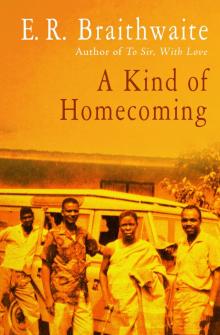 A Kind of Homecoming
A Kind of Homecoming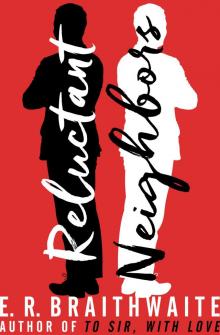 Reluctant Neighbors
Reluctant Neighbors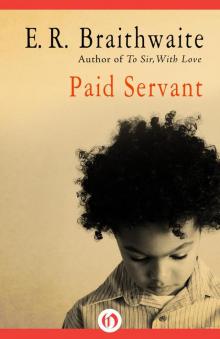 Paid Servant
Paid Servant Billingsly
Billingsly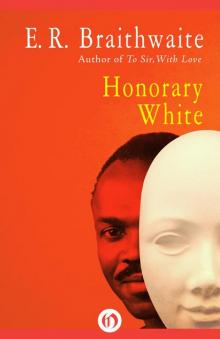 Honorary White
Honorary White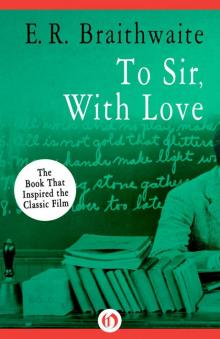 To Sir With Love
To Sir With Love Choice of Straws
Choice of Straws